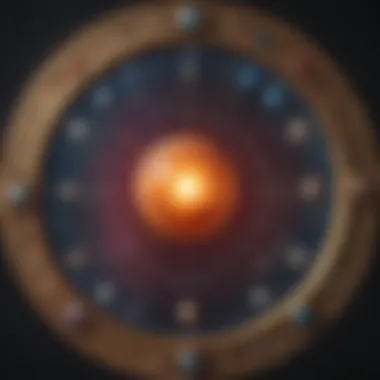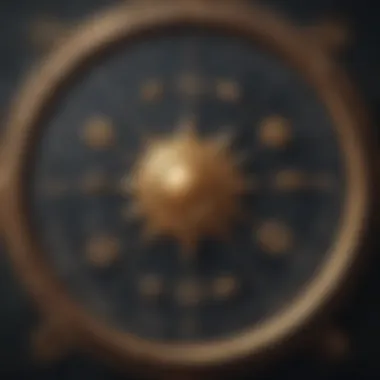Exploring the Pregnancy Prediction Chart: Astrology Insights


Intro
The exploration of pregnancy prediction charts through astrology offers a unique vantage point for those intrigued by both celestial movements and personal planning. By investigating the intersections of astrological principles and conception phases, this article aims to unpack the complexities that form the foundation of pregnancy prediction. A robust understanding of zodiac signs and their respective influences can provide valuable insights, not just for expectant parents but also for astrologers and esoteric practitioners alike.
Understanding the Zodiac
Overview of Zodiac Signs
The zodiac system, which encompasses twelve signs, serves as a key element in astrological practices. Each sign represents distinct characteristics and influences, shaping individual behaviors and life choices. Understanding these signs can enhance the interpretation of pregnancy prediction charts. The signs are as follows:
- Aries
- Taurus
- Gemini
- Cancer
- Leo
- Virgo
- Libra
- Scorpio
- Sagittarius
- Capricorn
- Aquarius
- Pisces
Sign Traits and Characteristics
Each zodiac sign bears specific personality traits that contribute to the astrological narrative surrounding pregnancy. For instance, a person with a Cancer sun sign often embodies nurturing qualities, arguably influencing their approach to family and parenthood. On the other hand, an individual with an Aquarius sun might prioritize independence, reflecting a contrasting perspective on family life.
This diversity among signs allows astrological analysts to draw nuanced conclusions regarding pregnancy prediction. Sign placements can indicate different emotions, desires, and readiness for parenthood, painting a more detailed picture of one's journey to conception.
Elemental Qualities
The zodiac signs are categorized into four elemental groups: fire, earth, air, and water. Each element encapsulates specific attributes:
- Fire Signs (Aries, Leo, Sagittarius): Dynamic and enthusiastic.
- Earth Signs (Taurus, Virgo, Capricorn): Practical and grounded.
- Air Signs (Gemini, Libra, Aquarius): Intellectual and communicative.
- Water Signs (Cancer, Scorpio, Pisces): Emotional and intuitive.
Understanding these elemental qualities can further elucidate potential compatibility with pregnancy prediction efforts and the overall journey to family life.
Astrological Insights
Current Astrological Trends
Astrology is not static; current trends reflect shifting celestial dynamics that can significantly impact personal lives. The phase of the moon, for instance, often correlates with heightened fertility periods. Staying attuned to such trends can assist prospective parents in timing their efforts for conception more effectively.
Influence of Celestial Events
Celestial events, such as eclipses or retrogrades, also warrant consideration. These happenings may alter energies that affect emotional states, which can either support or hinder conception efforts. A lunar eclipse, for example, could signal a period of emotional release, potentially impacting one's readiness to embrace parenthood.
How to Interpret Your Birth Chart
To delve into the astrological implications of pregnancy, one must interpret their birth chart. This chart maps the positions of the planets at the exact time of one's birth, offering valuable insights:
- Sun Sign: Core personality traits.
- Moon Sign: Emotional needs and subconscious drivers.
- Rising Sign: How one is perceived by others.
Combining these elements can yield a comprehensive understanding of how an individual may navigate the complexities of pregnancy and parenthood.
Horoscope and Predictions
Monthly or Weekly Forecasts
Horoscopes serve as a practical tool for anticipating what each period may hold. Frequent updates can provide timely advice tailored to one's unique astrological profile.
Personalized Horoscope Reading
Consulting an astrologer for a personalized horoscope allows individuals to gain deeper insights into their specific situations. This kind of reading often considers individual planets and their aspects, specifically those related to love and family, offering targeted guidance for conception.


Compatibility Readings Based on Zodiac Signs
Understanding compatibility through zodiac signs can enhance relationship dynamics, crucial for a healthy path to family planning. Certain signs may naturally align in their desires for family life, while others may need to navigate more complex emotional terrains. Compatibility readings provide clarity on how best partners can support each other's journeys to parenthood.
Foreword to Pregnancy Prediction Charts
Pregnancy prediction charts hold a significant place within astrological practice. They serve as a bridge between celestial phenomena and the deeply personal journey of conception and parenthood. Understanding these charts is essential for both practitioners and those seeking insights into their reproductive paths. The information embedded in these charts can guide expectant parents by aligning personal aspirations with astrological energies.
Understanding Pregnancy Prediction
At the core of pregnancy prediction is the fundamental premise that celestial alignments might influence human experiences, particularly conception and pregnancy. The various components of a pregnancy prediction chart—like zodiac signs, planetary positions, and lunar phases—can provide important insights. Each element in the chart tells a story, revealing potential time frames for conception based on broader astrological influences. This predictive framework is not merely speculative but gives a structured approach to understanding personal circumstances in the context of cosmic events.
Interactions between planets and signs offer insights into the emotional and physical energies that might surround conception. For instance, some astrologers believe that the position of Venus can indicate love and familial stability, while the Moon represents fertility and nurturing aspects. These intricate relationships might help people identify favorable periods for conception or illuminate challenges they may encounter along the way.
Historical Context of Astrological Practices
To grasp the relevance of pregnancy prediction charts today, it is fruitful to explore their historical context. Astrological practices date back thousands of years, with civilizations such as the Babylonians and Egyptians recording astronomical observations and their impact on daily life. The intertwining of astrology with various cultural beliefs created a rich tapestry that continues to influence modern practices.
Astrology has traditionally been used to guide decisions related to agriculture, health, and relationships. In some cultures, fertility was seen as closely linked to celestial movements. Historical texts reveal that many societies kept elaborate records of astrological phenomena, believing they could predict important life events, including childbirth.
Today, the use of pregnancy prediction charts is regarded with varying degrees of skepticism, but they remain a part of a holistic approach to family planning for many. The combination of historical context and modern understanding provides a foundation from which expectant families can explore their paths, continually blending ancient wisdom with current practices.
Understanding pregnancy prediction charts not only highlights the relationship between personal experiences and cosmic influences but also demonstrates how astrology has evolved over time, reflecting changing cultural attitudes toward fertility and family planning.
The Structure of a Pregnancy Prediction Chart
Understanding the structure of a pregnancy prediction chart is crucial for anyone looking to explore the interplay between astrology and conception. This section breaks down the essential components of these charts. It also sheds light on their significance in astrological interpretation. Structurally, these charts weave together various astrological elements, allowing for a comprehensive analysis of fertility and conception.
Key Components of the Chart
Zodiac Signs
Zodiac signs play a vital role in pregnancy prediction charts. Each sign corresponds to different characteristics and influences that can affect conception. The key characteristic of zodiac signs is their association with elements and modalities, which can provide insight into how an individual's birth chart interacts with potential pregnancy outcomes.
Many people find zodiac signs to be beneficial due to their established significance in astrology. For example, a sign like Cancer is often linked to nurturing and fertility. This makes it a relevant focus in discussions around conception. A unique feature of zodiac signs is their ability to reflect personal traits that may influence reproductive health. However, relying solely on zodiac signs may overlook other factors that contribute to conception.
Planetary Influences
Planetary influences are another core component of pregnancy prediction charts. Each planet governs specific energies and aspects of life. This can include fertility, relationships, and emotional well-being. A key characteristic of planetary influences is their dynamic nature; they change regularly due to their orbits.
The planets, especially Venus and the Moon, are popular choices in analyzing fertility. Venus represents love and attraction, while the Moon symbolizes emotions and cycles. One unique feature of planetary influences is their transiting positions. This can greatly affect timing for conception. However, reliance on these influences can be limiting, as planets may not always provide a clear answer regarding fertility.
Houses in Astrology
The houses in astrology give context to the zodiac signs and planetary influences within a chart. Each house represents different life areas, including those related to family and parenthood. A key characteristic of houses is their ability to provide nuanced insights into personal circumstances. For instance, the Fourth House relates to the household environment, which can be pivotal for expectant parents.
Houses are advantageous because they allow for a detailed analysis about where someone may encounter challenges or support during the conception process. The unique feature of houses is that they correspond with various life events, enabling a tailored approach for personal insights. However, the complexity of houses may lead to confusion for those unfamiliar with astrological concepts.
Chart Interpretation Overview
Interpreting a pregnancy prediction chart requires a comprehensive understanding of its components. The structured combination of zodiac signs, planetary influences, and houses forms a narrative about an individual's potential fertility journey. This overview sets the stage for deeper explorations of how timing and astrological contexts may play out.
Understanding the integral structure of pregnancy prediction charts can empower individuals to make informed decisions about family planning and conception.
Astrological Indicators of Conception


Astrological indicators of conception hold significant weight in the context of pregnancy prediction charts. These indicators revolve around various celestial bodies and their positioning. Understanding their roles can help individuals navigate personal family planning. Astrological insights can offer expectations about fertility and potential challenges.
Planetary Positions
Planetary positions are crucial in astrological readings as they provide a snapshot of the heavens at a specific time. Each planet represents distinct energies that correlate with specific aspects of life, including conception.
The Role of Venus
Venus, known as the planet of love and fertility, plays a vital role in conception. This planet governs relationships and reproductive health. When Venus is well-placed in a chart, it can signify favorable conditions for conception. A strong Venus aspect often indicates emotional harmony and the potential for nurturing relationships.
A unique characteristic of Venus is its connection to beauty and pleasure, which can enhance the desire for family creation. However, if Venus is poorly aspected, it might reflect challenges in relationships that could affect the conception process. Overall, observing Venus can provide valuable insights for those considering family planning.
The Influence of the Moon
The Moon symbolizes emotions and intuition, crucial elements in the conception journey. Its position in a pregnancy prediction chart can reveal emotional states and moods surrounding family planning. A favorable lunar aspect can heighten receptivity and intuition, aiding couples in understanding their readiness to conceive.
The Moon has a distinct feature of relating to cycles, which can connect to fertility cycles in women. Thus, tracking the lunation phases is beneficial when assessing optimal times for conception. On the downside, challenging lunar positions could reflect emotional turmoil or confusion, which may hinder the conception process.
Jupiter's Significance
Jupiter, often associated with expansion and abundance, holds importance in fertility charts as well. It symbolizes growth and prosperity within family dynamics. A well-aspected Jupiter can suggest auspicious conditions for conception and increase the likelihood of a successful pregnancy.
Jupiter’s unique feature is its ability to amplify the energies of other planets it interacts with, especially those related to fertility. This planet can inspire optimism and hope in expectant parents. However, if Jupiter is poorly positioned, it might lead to over-ambition or unrealistic expectations regarding family planning.
Transits and Progressions
Transits and progressions refer to how the movement of planets influences an individual's birth chart over time. These celestial movements can signal appropriate moments for initiating the conception process. By analyzing transits and progressions, expectant parents can gauge when circumstances might be favorable or challenging, thus enhancing their understanding of astrological implications on their family planning journey.
Timing and Fertility Windows
The concept of timing and fertility windows in astrology holds significant importance when assessing the dynamics of conception. Astrology posits that celestial events can influence events on Earth, including human reproduction. Understanding timing can help individuals align their actions with what is deemed favorable by astrological observations. This section delves into the role of lunar phases and optimal moments for conception.
Lunar Phases and Their Effects
Lunar phases play a crucial role in astrology, particularly regarding fertility and conception. The moon's cycle, which lasts approximately 29.5 days, goes through different phases: New Moon, First Quarter, Full Moon, and Last Quarter. Each phase is thought to carry specific energies that can influence emotional and physical states.
- New Moon: This phase symbolizes new beginnings. Many consider it a potent time for starting new projects, including family planning.
- Waxing Moon: During this time, energy is believed to grow, making it a favorable window for increasing fertility.
- Full Moon: The full moon is often associated with culmination and abundance. It can also be a time of heightened emotions, which might affect sexual desire.
- Waning Moon: This phase represents a time of reflection and completion. It may not be as optimal for conception but can be used for assessing and understanding past decisions.
Astrologers often recommend tracking these phases to discover personal patterns linked to fertility and emotional wellness. People might find that their menstrual cycles align with these phases, further enhancing insights into their reproductive health.
Optimal Astrological Timing for Conception
In addition to lunar phases, other astrological factors can guide individuals in choosing the right time for conception. This involves considering the positions of planets, particularly Venus and Jupiter, and how they interact with the zodiac signs at play. Some essential elements include:
- Transiting Jupiter: Jupiter is associated with growth and expansion. Its favorable position in your natal chart can signal a more auspicious time for conception.
- Venus in Favorable Aspects: As Venus governs love and relationships, its positive influence in your chart can enhance the chances of conception. Individuals may experience heightened desire and emotional stability.
- Moon in Fertility Signs: Certain zodiac signs, like Cancer or Pisces, are traditionally linked with fertility. When the moon transits these signs, it could be seen as a more favorable time for attempts at conception.
In practice, combining lunar phases with these planetary influences allows expectant parents to create a personalized fertility calendar. This calendar can help manage emotional well-being by aligning their conception efforts with celestial alignments. All these techniques, however, must be approached with an understanding that astrology is one of many tools for family planning, and not a guaranteed method.
Astrology offers a lens through which to view timing and fertility, presenting options for those hoping to conceive. Understanding the interplay of cosmic energies can be of great benefit.
Potential Limitations of Pregnancy Prediction Charts
Understanding the potential limitations of pregnancy prediction charts is crucial for anyone interested in astrology and its application to family planning. While these charts offer insights, they also come with challenges and skepticism. Recognizing these limitations helps in discerning realistic expectations and responsibilities when utilizing astrology in personal matters, especially concerning pregnancy.


Skepticism in Astrology
Skepticism towards astrology is a persistent theme that can overshadow the potential benefits offered by pregnancy prediction charts. Critics argue that astrology lacks empirical evidence and reliable methodologies. They point out that astrological interpretations can be subjective, varying significantly among practitioners. This situation raises concerns over the validity of predictions made through these charts.
Moreover, the reliance on celestial movements has been challenged by proponents of scientific skepticism. The argument is that human behavior and bodily functions are influenced by numerous factors, such as genetics, environment, and personal choices. Therefore, attributing the ability to conceive or carry a pregnancy to planetary alignment is seen as overstating the role of astrology. Some critics propose that expectations created by pregnancy prediction charts can lead to emotional dissatisfaction if these predictions do not materialize as anticipated.
A clear understanding of these concerns provides a context for individuals exploring pregnancy prediction through astrology. It is essential to approach predictions with awareness and to combine astrological insights with practical medical advice.
Ethical Considerations
The ethical implications of using pregnancy prediction charts cannot be overlooked. Astrologers must navigate the fine line between providing guidance and imposing beliefs on clients. There is an inherent responsibility to communicate the nature of predictions accurately. Misleading confidence in the potential outcome can lead to distress, especially in sensitive issues like conception and pregnancy.
Individuals seeking astrological advice might place undue trust in predictions, potentially neglecting medical consultations or lifestyle adjustments needed for optimal fertility. Astrologers should encourage clients to view charts as one of many tools for personal insight rather than definitive answers.
Additionally, issues such as cultural beliefs and personal values come into play. Different cultures perceive astrology differently, and what may seem acceptable in one context might clash with another. Astrologers should be culturally aware and sensitive to such variations to respect the diverse backgrounds of their clients.
In summary, considering the limitations and ethical concerns surrounding pregnancy prediction charts fosters a balanced approach. It reminds both practitioners and clients to be prudent, allowing for informed decision-making that blends astrological insights with reality.
Practical Application of Pregnancy Prediction Charts
The practical application of pregnancy prediction charts offers a unique framework for individuals exploring family planning. By merging astrological insights with personal circumstances, these charts can provide various benefits. Understanding one's astrological chart could lead to more informed decisions about conception and pregnancy.
Using these charts, expectant parents might gain insights into favorable timings for conception. Additionally, they can reveal potential challenges based on planetary positions. It is crucial to approach this practice with an open mind, recognizing both its potential benefits and its limitations.
Using Charts for Personal Insights
The use of pregnancy prediction charts serves as a personal tool for self-reflection. As individuals analyze their own charts, they may identify patterns that align with their reproductive journey. This personalized approach enhances understanding of the emotional and physical factors at play during conception and pregnancy.
For some, it may also provide comfort, knowing that astrological influences could guide their decisions. Recognizing these influences can empower people to align their actions with favorable astrological periods. Ultimately, the insights gained from these charts can serve to affirm personal feelings and choices.
Consulting an Astrologer
Consulting a professional astrologer can deepen the experience with pregnancy prediction charts. An expert can provide a nuanced interpretation of the chart, tailored to specific life circumstances. This personalized guidance helps individuals navigate the complexities of their astrological influences.
Finding the Right Practitioner
Finding the right practitioner is fundamental to obtaining accurate insights. A skilled astrologer should have a solid understanding of both astrology and the nuances of pregnancy prediction. Look for someone who is not only knowledgeable but also experienced in this specific area of astrology. Client testimonials and referrals can also assist in locating a reputable astrologer. The right practitioner can offer vital information, enhancing the overall experience.
Questions to Consider
When meeting with an astrologer, preparing questions can enrich the consultation process. Important questions may concern the best timings for conception or how current planetary transits could affect pregnancy. Thoughtful inquiries can lead to deeper insights, helping individuals understand how astrology interacts with their personal situations. This proactive approach ensures that the session is effective and tailored to the individual's needs.
End and Future Perspectives
The integration of astrology into the world of pregnancy prediction creates a unique intersection of beliefs, methodologies, and techniques. In this exploration, we have discussed how pregnancy prediction charts serve as invaluable tools. These charts not only provide insights into potential fertility windows but also combine the cosmic influences that may affect conception and pregnancy outcomes. Understanding their use and implications is paramount for anyone involved in family planning.
Reflections on Astrological Practices
Astrology has long fascinated humanity, and its practices often spark diverse opinions. For some, it is a guiding force delineating one's path in life. For others, it is met with skepticism. Regardless of perspective, many find value in utilizing astrology as a personal tool. Pregnancy prediction charts harness astrological wisdom to offer individualized insights. Expecting parents may reflect on their cosmic alignments, considering not only their birth charts but also the planetary influences at play during their conception journey.
Moreover, these charts reframe expectations and contribute to self-awareness. By examining astrological indicators, one can foster an understanding of their emotional and psychological readiness for parenthood. This self-awareness can aid in aligning personal desires with cosmic energies, making the journey to parenthood more conscious and guided.
The Evolving Role of Astrology in Family Planning
As society becomes increasingly open to holistic practices, astrology's role in family planning evolves. Traditionally, family planning focused solely on medical and biological aspects. However, there is a growing recognition of the emotional and spiritual dimensions surrounding conception and pregnancy. Astrology taps into these elements, creating a broader understanding of the influences at play.
With advancements in personalized astrology software, practitioners now have access to more precise tools. They can offer tailored insights based on individual charts and current astrological events. This evolution represents a shift towards a more integrated approach to family planning, where astrology coexists with conventional methods.
The future will likely see an increased dialogue between astrological experts and health professionals, as both parties recognize the value of a holistic approach. Ultimately, this collaboration may offer a deeper understanding of how cosmic patterns can influence human experiences, particularly in the intimate realm of pregnancy.
Astrology provides not only insight but also a language through which people can express their hopes and intentions regarding family planning.







